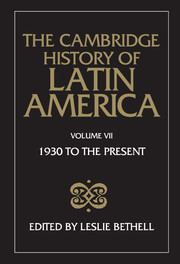13 - Puerto Rico since 1940
from PART THREE - THE CARIBBEAN
Published online by Cambridge University Press: 28 March 2008
Summary
After four hundred years of Spanish colonial rule Puerto Rico fell under the direct control of the United States in 1898. It has remained so ever since. Its status within the U.S. political system has always been uncertain and anomalous. Unlike Hawaii and Alaska – considered territories ‘incorporated’ into the United States and thereby candidates for future inclusion in the federal system as states of the Union – Puerto Rico was placed in the novel judicial category of an ‘unincorporated territory’. No one in political authority in the United States ever accepted that Puerto Rico, unlike Cuba and the Philippines, should be directed towards even nominal independence.
The island's colonial dependency continued, therefore, into the twentieth century under a new and culturally alien power. Indeed, as the century draws to a close dependency is still in issue. After ninety years under the U.S. flag, of participation of its youth in U.S. wars in Europe and Asia, large migrations to and from the northern metropolis, complete economic integration, and subjection to U.S. sponsored ‘modernization’ in all its forms – Puerto Rico remains a fundamentally Spanish-speaking ‘Latin American’ country with a clear sense of cultural and political seperateness from the system of which it is, for better or worse, part.
In 1940 on the eve of U.S entry into the Second World War the executive power on the island was still exercised by presidentially appointed governors; the educational system remained firmly committed to the imperial idea of ‘Americanization’; the major industry, sugar, hard-hit by the world depression of the 1930s, was in clear decline; unemployment, poverty and discontent were rampant; political violence was increasing; and a wave of nationalism and aggressive movements for Hispanic cultural affirmation were gathering force and influence.
- Type
- Chapter
- Information
- The Cambridge History of Latin America , pp. 579 - 599Publisher: Cambridge University PressPrint publication year: 1990



